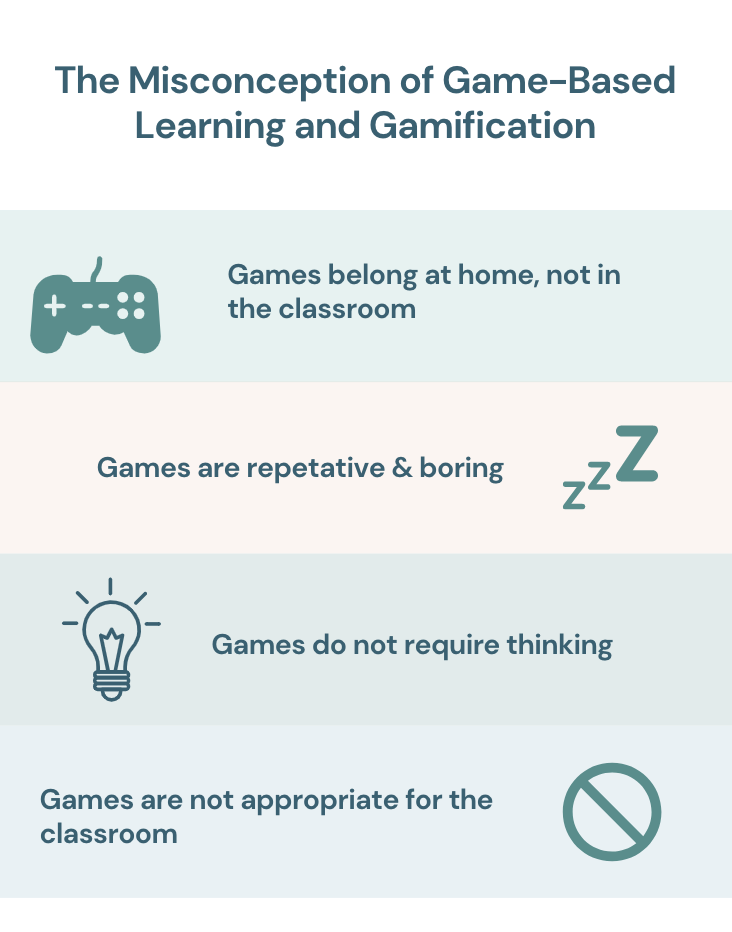
To begin let’s clarify what exactly Game Based Learning and Gamification are and how they differ from one another. Game Based Learning utilizes games to enhance students’ understanding of a topic (“Game based learning definition and meaning.” 2019). The goal is to increase students’ knowledge through playing while simultaneously promoting engagement and motivation within students (“Game based learning definition and meaning.” 2019). For instance, point systems, badges, and leaderboards are some components of this type of learning (“Game based learning definition and meaning.” 2019).
“Game Based Learning is where game characteristics and principles are embedded within learning activities”
“Game based learning definition and meaning.” 2019
Gamification is using characteristics of a game in the hope to increase student excitement regarding what they are learning and provide a new approach to teaching (Gamification in education: What is it & how can you use it? 2020).
“Gamification in education is the use of game-desing elements and game principles in non-game context”
(“Gamification in education: What is it & how can you use it?” 2020)
To clearly distinguish the two, Gamification is taking ideas and concepts from a game and applying them to a non-gaming environment (“Game-based learning 1.1: Myths & mistakes.” 2020). Meanwhile, Game-Based Learning is taking the actual game and integrating it into the learning environment. This requires actually bringing the game into the classroom and using it to drive the lesson (“Game-based learning 1.1: Myths & mistakes.” 2020).
Now that we have clearly defined what the two concepts are, let’s discuss why it is important to address certain misconceptions regarding Game-Based Learning and Gamification. By addressing these issues, one can be confident in their learning theory. For starters, a misconception is that games do not belong in the classroom. Kids are often rewarded or punished with games. Games are a way to extrinsically motivate children. For instance, if a child performs poorly on an exam in school, parents will take away their PlayStation as a form of punishment. One might think that games do not have a place in the classroom. That is in fact, not the case. By addressing this misconception, one could see that Game-Based Learning and Gamification are a way to intrinsically motivate a child’s learning (“Game-based learning 1.1: Myths & mistakes.” 2020). Game-Based Learning and Gamification allow learners to develop their own experience rather than refer to the teacher.
Another misconception is that games are not appropriate for the classroom. One might be alarmed with games in the classroom as there is a lot of content online that is not appropriate for the classroom (“Game-based learning 1.1: Myths & mistakes.” 2020). For instance, there is a wide range of video games that include violence (“Game-based learning 1.1: Myths & mistakes.” 2020). That being said, monetizing and ensuring the games are appropriate for the classroom can avoid this.
One might think that games are repetitive and could only provide so much learning experience (“Game-based learning 1.1: Myths & mistakes.” 2020). Although, this is not the case. Technology is growing at such a fast pace, with games and also evolving ever so quickly. Games allow for more player freedom. The games allow for the user to apply their skills and progress. On the other hand, one might agree that games do not require any attention or ‘thinking’ (“Game-based learning 1.1: Myths & mistakes.” 2020). That also can be argued with today’s technology. Modern games are more in-tune with the user (“Game-based learning 1.1: Myths & mistakes.” 2020). Games provide challenges that require critical thinking skills (“Game-based learning 1.1: Myths & mistakes.” 2020). Game-Based Learning and Gamification require the learner to experiment while actively applying their knowledge (“Game-based learning 1.1: Myths & mistakes.” 2020). Game-Based Learning and Gamification allow for active learning.
Now, try it out yourself! Click
Game based learning definition and meaning. Top Hat. (2019, September 16). Retrieved October 29, 2021, from https://tophat.com/glossary/g/game-based-learning/#:~:text=Game%20based%20learning%20is%20also,thinking%20and%20problem%20solving%20skills.
Game-based learning 1.1: Myths & mistakes. LearnJam. (2020, January 31). Retrieved October 30, 2021, from https://learnjam.com/game-based-learning-1-1/.
Gamification in education: What is it & how can you use it? True Education Partnerships. (2020, April 1). Retrieved October 29, 2021, from https://www.trueeducationpartnerships.com/schools/gamification-in-education/.
Leave a Reply
You must be logged in to post a comment.